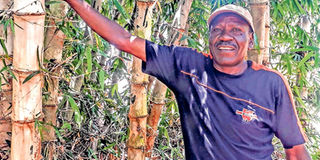Beauty, money in versatile bamboo

Alloys Barasa who cultivates bamboo in his farm in Butula, Busia County. Besides getting money by selling bamboo stems, he also earns by selling the plant's seedlings at Sh100 each. PHOTO | PETER CHANGTOEK | NATION MEDIA GROUP
What you need to know:
- He is currently farming the crop on an acre.
- Besides getting money by selling bamboo stems, he also sells seedlings at Sh100 each.
- The crop, when mature, can be used to make various products such as floor tiles, baskets, boats, furniture and toothpicks.
- He adds that one of the advantages of bamboo is that it is a highly renewable resource.
Alloys Barasa holds the stem of one of his mature bamboo plants on his farm in Butula, Busia County, with a smile.
The farmer developed interest in the plant after reading a newspaper article in 2004 and decided to give it a try.
“The article was about a farmer who was growing bamboo in Gatanga and was using it to make a variety of items,” he recalls.
Before getting into the trade, Barasa consulted officials of the Kenya Forest Research Institute (Kefri) in Nairobi, and later purchased seedlings of the Giant bamboo (Dendrocalamus giganteus) and Yushania alpina varieties.
He is currently farming the crop on an acre. “The plant takes five years to mature. Bamboo is planted in a spacing of six feet. One can use seedlings or cuttings, I prefer the later,” he says, adding that before planting the grass, a farmer has to prepare the land well by digging it and mixing the soil with manure.
To use the cuttings, one cuts the rhizomes from the parent plant with a saw. Then cuts back the culms at least one-third of their height and then plants the cutting in the soil, explains Barasa.
According to the farmer, bamboo is a hardy crop as his plants have neither been attacked by pests nor diseases since he started the agribusiness more than a decade ago.
Besides getting money by selling bamboo stems, he also sells seedlings at Sh100 each.
“I sell Giant bamboo stems at Sh400 each. Most people buy them to propagate seedlings. I also sell Yushania at Sh200 each,” he says, adding that students, mainly scouts, buy at Sh150 a pole for making camping tents. Young plants can also be consumed like arrowroots, notes the farmer.
Although he faces some challenges finding market for his produce, the farmer reiterates that bamboo growing can earn one good money.
“If you plant them using the right spacing and get ready market, you can earn up to Sh1 million from an acre as the crop regenerates after harvesting,” he reveals.
LUCRATIVE VENTURE
The crop, when mature, can be used to make various products such as floor tiles, baskets, boats, furniture and toothpicks.
Mr Emilio Mugo, a former Kenya Forest Service director, says that the crop helps in curbing soil erosion.
“Bamboo forests, even when planted on small parcels of land by farming communities, help to control soil erosion, conserve biodiversity, beautify landscape and essentially contribute to purification and regulation of the environment,’’ he says.
He adds that one of the advantages of bamboo is that it is a highly renewable resource.
“Even as you harvest when it matures, it continues to regenerate.’’
Gordon Mwangi, an agronomist, says that there are many species of bamboos in the world.
“There are several species to chose from, but those that do well in Kenya include Bambusa vulgaris, Bambusa tulda, Denntrocalamus gigantis, Dentrocalamus asper, bush bamboo and Oxtenanthera abyssinia,” he offers.
“But farmers should first know where they can get market for their produce before planting the grass,’’ he adds.
He notes that when planting, a space of six feet should be left between plantlets.
“Farmers should do their bamboo planting during rainy season since the plants are heavy feeders. It takes about four to five years for them to mature. It can be a lucrative venture if at all one secures market for their produce,’’ says the agronomist.
Products made from bamboo include chairs, couches, tables, pen and bill holders, kitchen tongs, spoons, jugs, chopping boards, tooth picks, serviette holders, baskets, TV stands and coat holders, among others, with prices starting from Sh75 to Sh45,000 in the market.
Although bamboo furniture are light in weight, they are five times more durable than wood.





